Introduction: Rethinking Sleep and Brain Health Through Psychedelics
In recent years, the conversation surrounding the therapeutic potential of psychedelics has moved from the fringes of science into the mainstream, bringing with it a wave of curiosity and exploration. Among these substances, magic mushrooms—scientifically known as psilocybin mushrooms—have garnered increasing interest not only for their mind-altering effects but also for their capacity to support mental clarity, emotional well-being, and restorative sleep. While most research has focused on the role of psychedelics in treating conditions like depression and PTSD, a growing body of evidence suggests that there may be surprising cognitive benefits of using magic mushrooms for sleep. These findings are illuminating new paths for those seeking non-traditional yet scientifically grounded approaches to cognitive and emotional health. As we dive deeper into the neuroscience, history, and evolving medical research, this article will explore how magic mushrooms might enhance the quality of sleep, mental clarity, and overall cognitive function—bringing a fresh lens to the future of nootropic and memory-enhancing therapies.
You may also like: The Ultimate Guide to the Best Nootropic Mushrooms for Memory and Cognitive Enhancement
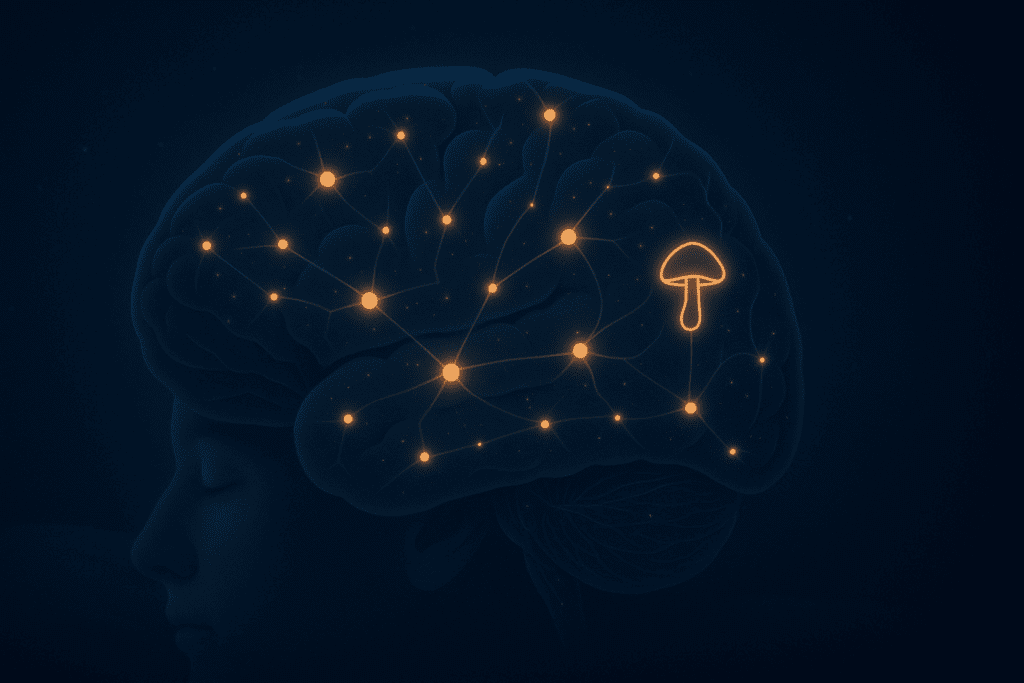
The Neuroscience of Sleep, Cognition, and Psilocybin
Sleep plays a fundamental role in memory consolidation, emotional regulation, and overall cognitive resilience. During deep sleep, the brain undergoes critical processes such as synaptic pruning, toxin clearance via the glymphatic system, and integration of daytime learning. Yet, millions suffer from poor sleep quality due to stress, anxiety, and neurochemical imbalances. Here is where psilocybin—the psychoactive compound in magic mushrooms—emerges as a potential neurobiological modulator.
Psilocybin interacts primarily with serotonin 2A receptors in the brain, inducing changes in perception, cognition, and affect. Interestingly, these same receptors are implicated in the regulation of circadian rhythms and sleep architecture. Research published in Frontiers in Pharmacology suggests that serotonergic psychedelics can reset dysfunctional neural circuits, possibly alleviating the hyperarousal that often impairs sleep. Moreover, functional MRI studies reveal that psilocybin reduces activity in the default mode network (DMN)—a brain system associated with rumination and self-referential thought. This quieting of mental chatter may support smoother transitions into restful sleep while enhancing the brain’s ability to process memories and emotions.
Importantly, enhancing magic mushrooms as a cognitive tool requires an understanding of how acute and post-acute phases affect the brain. During the psychedelic experience itself, users report a dreamlike state that closely mimics REM sleep in terms of neurodynamics. Post-experience, individuals often describe improved sleep quality, mental clarity, and emotional balance, indicating a potential therapeutic window for neurocognitive rejuvenation. Far from being a mere hallucinogenic escape, psilocybin’s interaction with brain networks offers a promising route to holistic well-being.
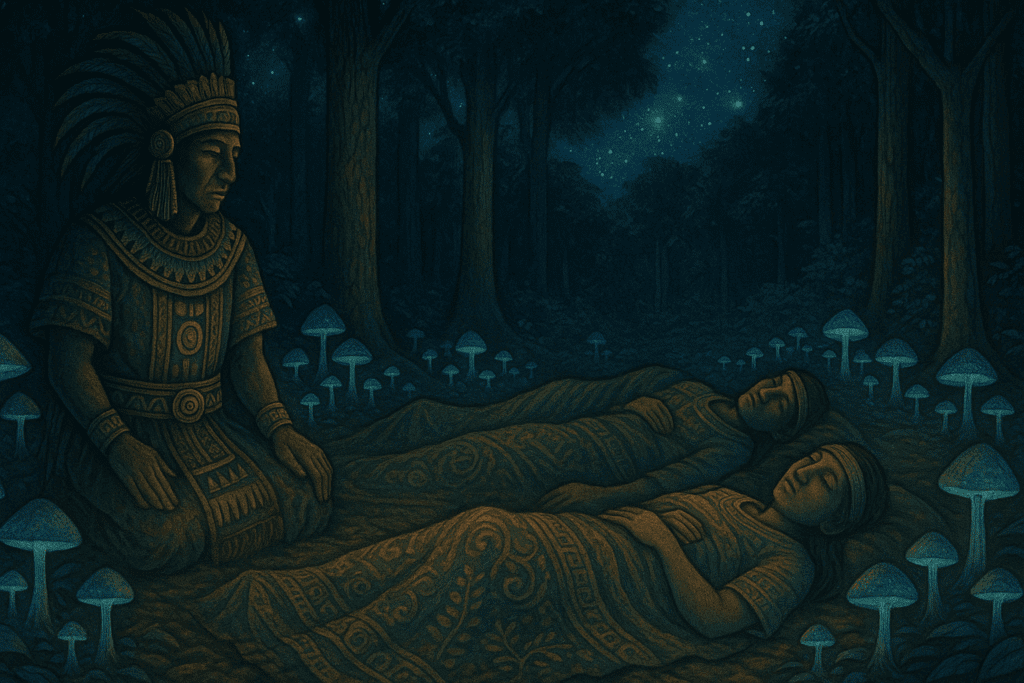
Historical and Cross-Cultural Perspectives on Psilocybin and Sleep
Long before Western medicine began investigating the effects of psilocybin, indigenous cultures across the globe had already tapped into the mystical and therapeutic power of magic mushrooms. In Mesoamerican traditions, sacred mushroom rituals—known as veladas—were used not only for spiritual visions but also for guidance in healing sleep disorders and emotional unrest. Shamans viewed sleep and dreaming as gateways to wisdom, and psilocybin was a tool to enhance dream lucidity, emotional integration, and inner peace.
These historical contexts underscore a more holistic understanding of consciousness that aligns surprisingly well with emerging neuroscientific perspectives. In Mazatec culture, magic mushrooms were seen as sacred agents of nighttime insight, providing access to the unconscious mind. Reports from early ethnographers reveal that post-ceremonial sleep was often described as “cleansing” and “deeply peaceful,” with users waking up refreshed and unburdened. Such experiences bear a striking resemblance to modern descriptions of psilocybin-assisted therapy.
Modern clinical frameworks are now revisiting these age-old insights, aiming to understand how the ritualized use of psychedelics may have contributed to balanced sleep cycles and psychological resilience. It becomes increasingly clear that these substances have been historically used not merely for their visionary effects but as tools to enhance cognition, emotional clarity, and sleep quality. As Western science continues to catch up with ancient wisdom, the convergence of ethnobotanical traditions and modern neurobiology reveals the profound value in revisiting these sacred compounds.
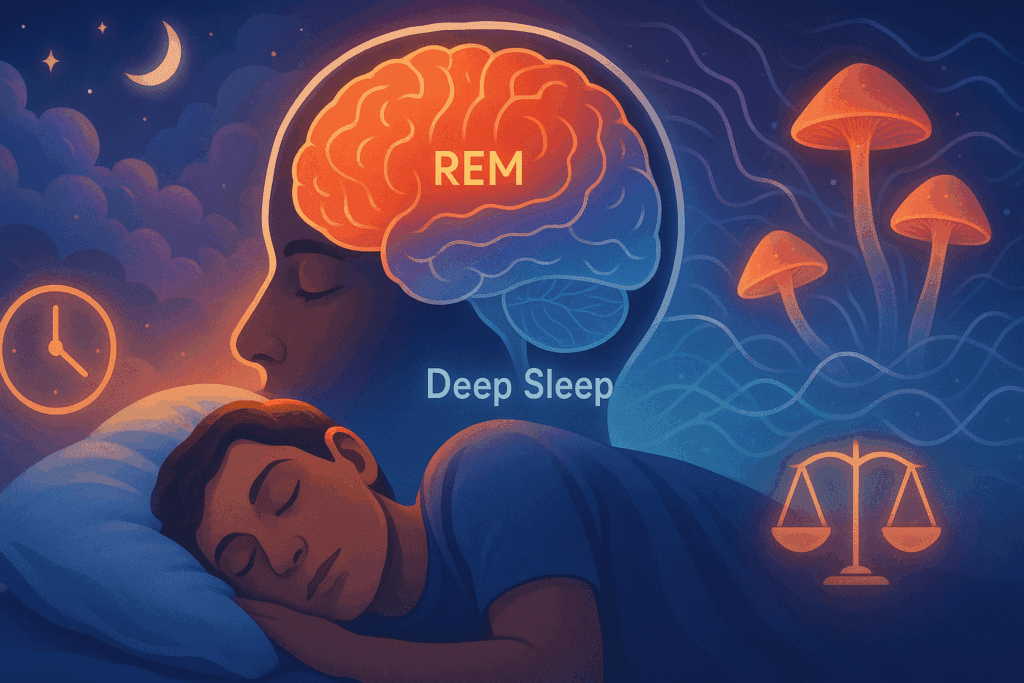
How Magic Mushrooms for Sleep Influence REM and Deep Sleep Patterns
Among the most fascinating aspects of recent research is the impact of magic mushrooms for sleep on the architecture of slumber. Human sleep is divided into several stages, including REM (Rapid Eye Movement) and non-REM stages such as slow-wave deep sleep. Each stage serves specific physiological and psychological functions. While REM sleep is associated with emotional processing and memory consolidation, deep sleep is critical for neurogenesis, physical restoration, and immune function.
Preliminary studies suggest that psilocybin may facilitate a kind of “reset” for disrupted sleep cycles. Anecdotal evidence and controlled trials indicate that after a controlled psychedelic session, users often report fewer awakenings during the night and more vivid dreaming. These dreams are not chaotic or distressing but rather rich in emotional and symbolic content—often resulting in psychological insight and catharsis. This REM rebound effect could be crucial for individuals suffering from insomnia, nightmares, or fragmented sleep.
Furthermore, by decreasing activity in the default mode network and enhancing thalamocortical communication, psilocybin may improve the continuity and depth of slow-wave sleep. This is particularly significant because disruptions in deep sleep are closely tied to cognitive decline, mood disorders, and reduced executive function. Enhancing magic mushrooms as tools for neurorestorative sleep opens the door to new interventions for age-related memory loss and chronic fatigue syndromes.
Clinical trials are still in early stages, but data from Johns Hopkins and Imperial College London offer promising clues. Participants in these studies often report that their post-treatment sleep is not only longer and deeper but also more refreshing. While more research is needed, these initial findings support the hypothesis that the serotonergic and neuroplastic effects of psilocybin may directly benefit sleep architecture and cognitive recovery.
Exploring the Science Behind Mental Clarity and Cognitive Resilience
Mental clarity—the ability to focus, reason, and problem-solve without mental fog—is an essential component of cognitive performance. In our overstimulated and sleep-deprived society, clarity of thought is often compromised by chronic stress, sleep disorders, and emotional dysregulation. Interestingly, many users of psilocybin report that the substance clears away cognitive clutter, revealing a refreshed and streamlined mode of thinking. This phenomenon is not simply anecdotal; there are real neurobiological mechanisms at play.
One of the most compelling features of psilocybin is its capacity to promote neuroplasticity—the brain’s ability to form new neural connections and reorganize existing ones. This is critical for learning, memory, and adaptive thinking. Research from institutions like Yale and UC Davis demonstrates that even a single dose of psilocybin can increase dendritic growth and synapse formation in key areas of the brain, including the prefrontal cortex and hippocampus. These are the very regions implicated in executive function, working memory, and emotional regulation.
Furthermore, psilocybin’s capacity to quiet the default mode network supports the emergence of novel associations, creative insights, and emotional breakthroughs. This heightened cognitive flexibility allows individuals to break out of maladaptive thought loops and engage in more constructive problem-solving. For those grappling with burnout, anxiety, or post-traumatic stress, such mental clarity can be life-changing.
Clinical practitioners are beginning to explore how these benefits can be harnessed in therapeutic contexts. From enhancing mindfulness practices to facilitating breakthrough moments in psychotherapy, the cognitive uplift associated with psilocybin appears to persist long after the acute effects wear off. When combined with the improved sleep quality discussed earlier, these neurocognitive gains paint a compelling picture of how magic mushrooms may support a more resilient, adaptive, and focused mind.
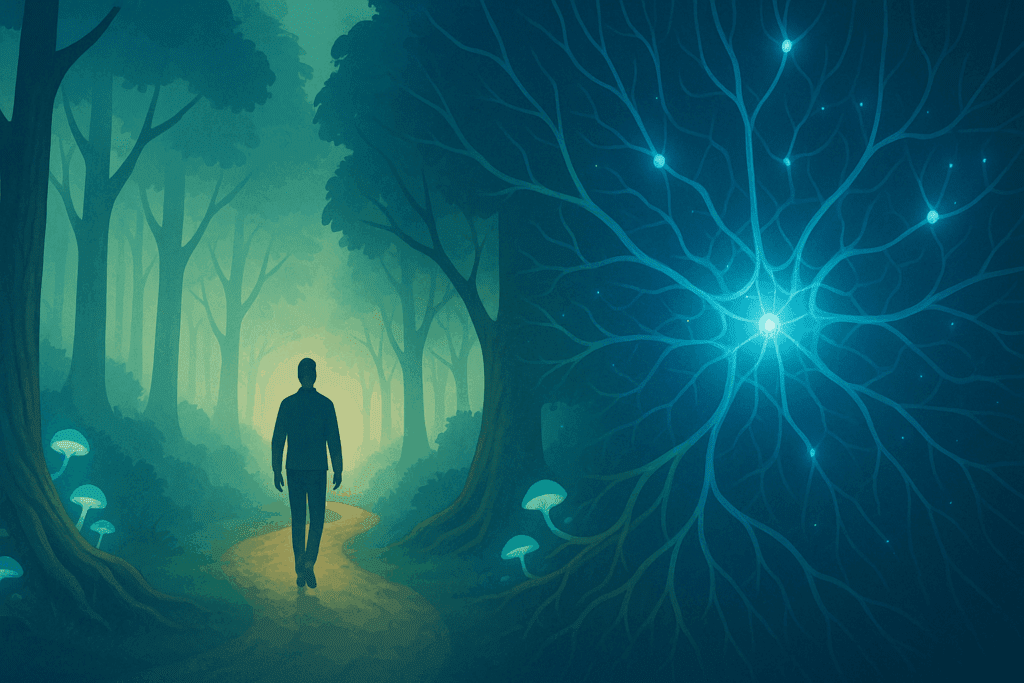
Magic Mushrooms for Sleep: Bridging the Gap Between Insomnia and Innovation
One of the most debilitating and widespread health issues today is chronic insomnia. Affecting nearly one-third of adults in industrialized nations, insomnia is linked to a host of downstream effects including anxiety, depression, metabolic dysfunction, and memory loss. Conventional treatments such as benzodiazepines, non-benzodiazepine hypnotics, and melatonin agonists often fall short due to side effects, tolerance development, and diminishing efficacy. This is where the potential of using magic mushrooms for sleep offers a refreshing alternative.
Unlike conventional sedatives that simply suppress arousal centers, psilocybin appears to modulate the neural circuitry underlying sleep regulation itself. Rather than acting as a blunt force sleep aid, it works in harmony with the body’s endogenous rhythms. Anecdotal reports and early clinical trials show that psilocybin sessions—particularly when guided by trained therapists—lead to improvements in sleep latency, continuity, and satisfaction. Individuals often find it easier to fall asleep in the days following a session, with fewer nighttime awakenings and more vivid, emotionally rich dreams.
This effect is especially pronounced in those with treatment-resistant insomnia or comorbid anxiety and depression. By alleviating the root causes of sleep disruption—such as hyperarousal, intrusive thoughts, and emotional distress—psilocybin offers a systems-level intervention rather than a symptomatic band-aid. Furthermore, it avoids many of the drawbacks of traditional sleep medications, such as next-day grogginess, memory impairment, and dependency.
The therapeutic window for enhancing magic mushrooms in this context is promising but requires careful framing. Set, setting, and dosage all play pivotal roles in determining outcomes. Clinical research protocols emphasize preparation, guided sessions, and integration to maximize benefits while minimizing risks. As regulatory frameworks evolve, we may see the emergence of psilocybin-based interventions tailored specifically for sleep enhancement and cognitive renewal.
Enhancing Magic Mushrooms as Cognitive and Emotional Catalysts
To truly harness the power of psilocybin, one must consider not only its pharmacology but also the conditions under which it is consumed. The concept of “set and setting”—referring to the mindset of the user and the environment of the experience—has long been recognized as crucial in determining the outcome of psychedelic sessions. When used with intention, structure, and support, magic mushrooms can act as powerful catalysts for emotional and cognitive transformation.
Therapeutically guided sessions allow for deep introspection, emotional processing, and behavioral re-patterning. This is especially relevant in cases of trauma, grief, and existential anxiety. The profound insights that often emerge can shift one’s perspective, leading to long-term improvements in mood, clarity, and resilience. By dissolving the egoic structures that often trap individuals in loops of worry and fear, psilocybin opens up space for healing and integration.
In parallel, cognitive benefits are enhanced by post-session practices such as journaling, meditation, and sleep hygiene. Many users find that their capacity to focus, plan, and connect with others is significantly improved in the weeks following a psilocybin experience. This “afterglow” phase appears to be a fertile window for behavior change, making it an ideal time to implement cognitive training, therapy, or creative projects.
Importantly, not all experiences are uniformly positive. Challenging emotions can arise, particularly if the session is poorly structured or if the individual is unprepared. However, when these challenges are navigated skillfully, they often lead to breakthroughs rather than breakdowns. This underscores the need for responsible frameworks and professional guidance in any therapeutic use of magic mushrooms.
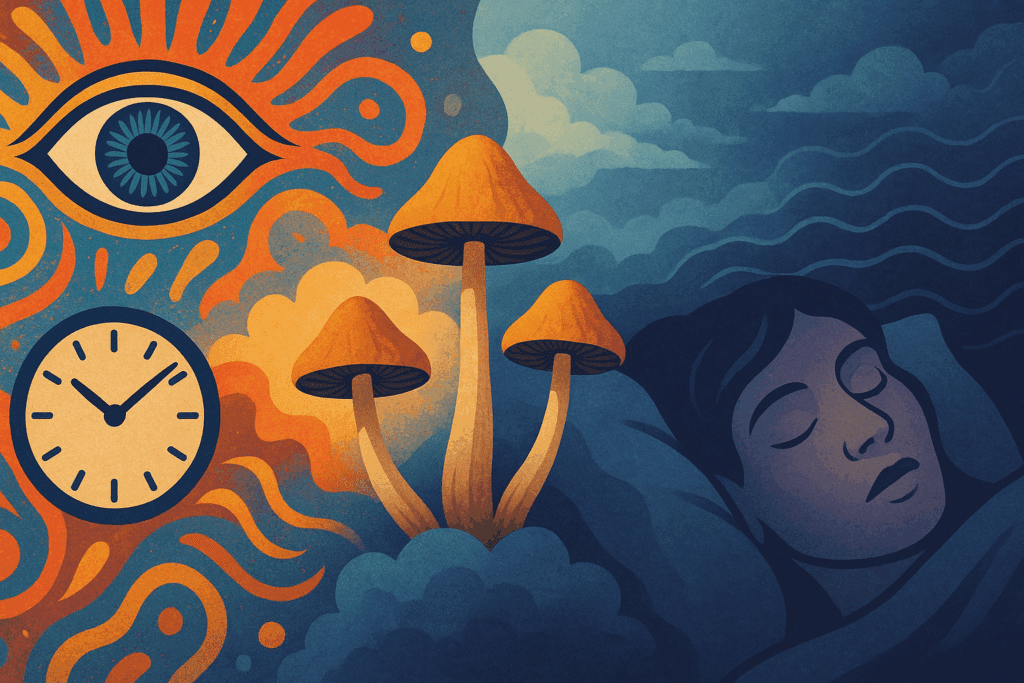
Do Shrooms Wake You Up? Investigating Alertness, Arousal, and Sleep Latency
As interest grows in the interaction between psychedelics and the sleep-wake cycle, a frequently asked question is: do shrooms wake you up? While the subjective effects of psilocybin can include heightened awareness, increased sensory perception, and expanded consciousness during the acute phase, this is not the same as traditional stimulatory alertness. Unlike caffeine or amphetamines, psilocybin does not function as a central nervous system stimulant. Instead, it alters consciousness through a reconfiguration of sensory and cognitive processing, which can lead to a transient experience of wakeful introspection.
That said, psilocybin’s influence on the brain’s serotonergic system can have unique consequences for arousal and sleep latency. Some users report delayed sleep onset if taken too late in the day, especially in higher doses. However, this initial alertness is often followed by a profound period of emotional resolution and central nervous system recalibration, making it easier to fall asleep in subsequent nights. In therapeutic settings, individuals often describe falling asleep more easily and waking more rested after integration.
The distinction between acute arousal and long-term regulation is key. While the immediate psychedelic experience may feel energetically activating, it is typically followed by what many describe as an emotional and cognitive “release.” This release often translates to lower baseline anxiety levels, fewer racing thoughts, and enhanced relaxation—factors essential for improving sleep initiation and maintenance.
From a neurochemical standpoint, psilocybin’s downstream effects may contribute to homeostatic rebalance of the hypothalamic-pituitary-adrenal (HPA) axis. By reducing chronic cortisol levels and modulating the amygdala’s threat perception, psilocybin may help mitigate the hyperarousal that underpins many forms of insomnia. Thus, while shrooms may briefly heighten alertness, they ultimately support a more regulated and restful sleep cycle over time.
The Afterglow Effect: Sustained Mental Clarity and Emotional Resilience
One of the most compelling aspects of psilocybin’s therapeutic profile is the “afterglow” effect—a phase that occurs days or even weeks after the acute psychedelic experience. During this window, users often report sustained improvements in mood, mental clarity, and interpersonal sensitivity. These benefits seem to coincide with enhanced neurogenesis and increased serotonin receptor sensitivity, particularly in regions like the anterior cingulate cortex and hippocampus.
This afterglow period is increasingly recognized as a key factor in the long-term success of psychedelic-assisted therapy. Patients often find they have a renewed sense of purpose, reduced emotional reactivity, and a sharpened capacity for concentration. Such improvements align closely with modern definitions of cognitive resilience—the brain’s ability to recover from stress and adapt to changing environments.
What makes the afterglow phase so critical is its openness to behavioral reinforcement. Individuals who engage in healthy sleep routines, journaling, or therapy during this time are more likely to lock in positive habits and cognitive patterns. Enhancing magic mushrooms with structured post-session integration appears to be an evidence-based pathway for maximizing therapeutic outcomes.
In the context of sleep, users in the afterglow often experience fewer interruptions, more vivid dreams, and deeper rest. This is especially true when the experience has been emotionally cathartic, allowing the nervous system to down-regulate sympathetic dominance. The interplay between emotional release and physiological restoration reinforces the idea that magic mushrooms for sleep represent a holistic therapeutic model—one that extends well beyond the night of ingestion.
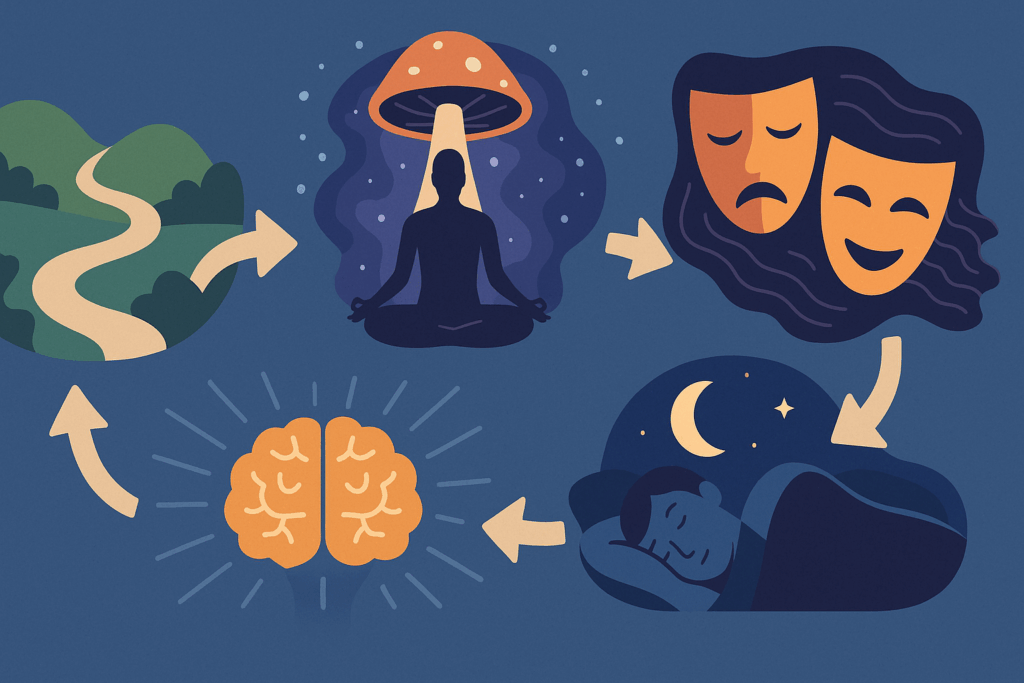
Enhancing Sleep Hygiene with Psychedelic-Assisted Practices
Sleep hygiene refers to the behavioral and environmental practices that promote consistent, quality sleep. While these practices are effective on their own, integrating them with the aftermath of psychedelic therapy may significantly amplify their benefits. Many users of psilocybin report feeling more in tune with their bodily rhythms and more motivated to adopt healthier routines in the days and weeks following their sessions. This is particularly meaningful for individuals who have struggled with sleep disorders for years despite adhering to traditional hygiene guidelines.
One reason for this synergy is the way psilocybin appears to reset circadian alignment. Individuals who previously experienced irregular sleep cycles, such as delayed sleep phase syndrome or shift work disorder, often describe a return to more natural sleep patterns post-treatment. This is likely due to the compound’s interaction with the brain’s serotonergic and melatonin pathways, which influence sleep onset and maintenance.
Moreover, the emotional clarity gained from a psilocybin session often encourages people to release destructive habits and reinforce positive behavioral changes. When combined with traditional practices such as reducing screen time before bed, limiting caffeine intake, and creating a calming bedtime routine, the result can be a deeply restorative sleep regimen. Psilocybin may serve not as a standalone solution but as a catalyst for adopting—and adhering to—these essential sleep strategies.
The integration phase of psychedelic therapy provides an ideal opportunity for implementing these changes. Patients can work with therapists, sleep coaches, or integrative health practitioners to build personalized sleep hygiene protocols that leverage the heightened neuroplasticity and emotional flexibility of the afterglow period. In this way, magic mushrooms for sleep become a cornerstone in a larger lifestyle overhaul aimed at sustainable wellness.
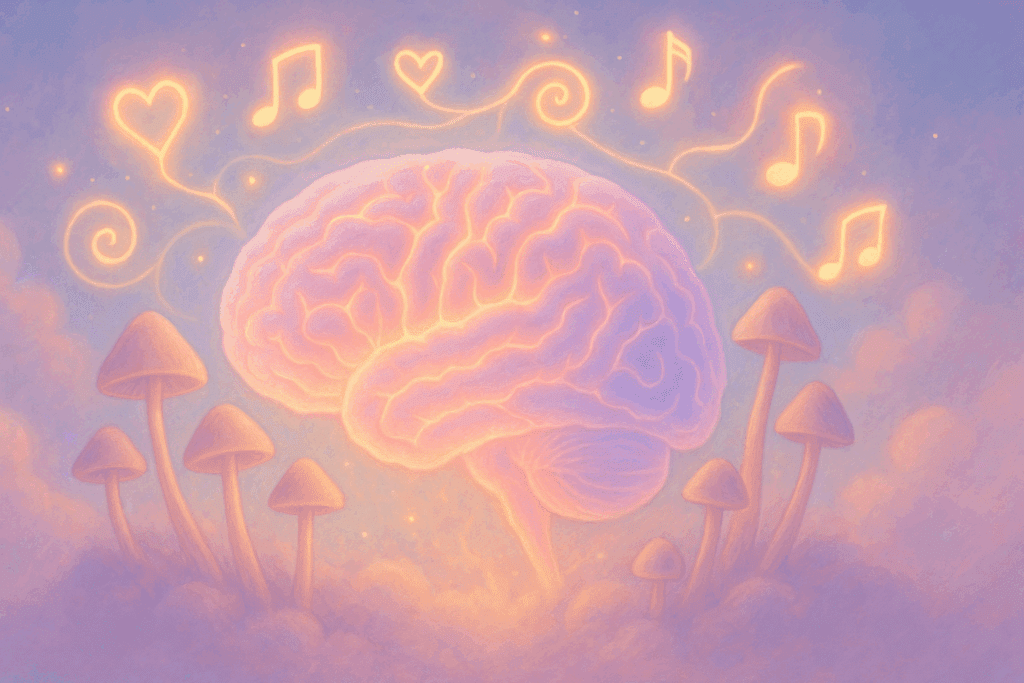
Magic Mushrooms for Sleep and Emotional Memory Consolidation
One of the lesser-known yet profoundly important aspects of sleep is its role in emotional memory consolidation. During REM sleep, the brain processes emotionally charged memories, integrating them into existing cognitive frameworks. This process is essential for learning, emotional regulation, and resilience. Disturbances in this cycle are often seen in individuals with PTSD, depression, and chronic anxiety—conditions that psilocybin has shown promise in treating.
Research suggests that psilocybin may enhance the brain’s ability to process and resolve emotional trauma, especially when supported by therapy and proper integration. Users frequently report vivid dream sequences and emotionally cathartic visions during and after a psilocybin journey. These dream-like episodes may mirror and even intensify the brain’s natural REM processes, offering a form of accelerated emotional integration.
The capacity to revisit, reframe, and reprocess traumatic memories in a safe and supported environment is a central feature of psychedelic-assisted psychotherapy. When this is followed by restorative sleep, the therapeutic gains are often more deeply encoded. In this sense, the use of magic mushrooms for sleep is not merely about inducing drowsiness but about enhancing the brain’s capacity to heal itself during the most neurologically active phases of rest.
Clinical reports further indicate that emotional memory consolidation after psilocybin is often accompanied by reduced amygdala hyperactivity and increased connectivity between the hippocampus and prefrontal cortex. These changes reflect a neurobiological shift toward greater emotional stability, reduced reactivity, and a heightened capacity for introspection and empathy. Such traits are crucial for both mental clarity and meaningful interpersonal relationships.
This unique interplay between psilocybin and sleep-dependent memory processing may ultimately redefine how we approach trauma therapy. By aligning therapeutic breakthroughs with the body’s natural recovery cycles, enhancing magic mushrooms as tools for both cognitive and emotional development becomes not only plausible but profoundly impactful.
Frequently Asked Questions About Magic Mushrooms for Sleep and Cognitive Benefits
1. What are the long-term effects of using magic mushrooms for sleep support?
While short-term effects of psilocybin on sleep are increasingly studied, long-term effects remain a developing area of research. However, early evidence suggests that periodic, intentional use of magic mushrooms for sleep may help recalibrate circadian rhythms and reduce chronic insomnia over time. Many individuals report a lasting decrease in anxiety and improvements in emotional regulation, which indirectly enhances sleep quality in the long run. The neuroplastic effects of psilocybin could contribute to more adaptive behavioral patterns around sleep hygiene. Still, because consistent dosing over long periods may alter serotonin sensitivity, medical supervision is essential for any long-term therapeutic plan.
2. Can microdosing improve focus and mental clarity without disrupting sleep?
Microdosing involves taking sub-perceptual doses of psilocybin to boost cognitive performance and creativity. When done responsibly, it appears to offer benefits such as enhanced mental clarity, sharper focus, and greater emotional resilience without interfering with sleep patterns. In fact, some users report improved sleep quality due to reduced anxiety and more stable moods. While the effects are subtler than full psychedelic doses, they can accumulate with regular use, making microdosing an attractive option for enhancing magic mushrooms’ benefits without the risk of sleep disturbance. However, research on microdosing is still emerging, and individual responses may vary.
3. Do shrooms wake you up if taken late in the day?
The question “do shrooms wake you up” is often raised by new users. In moderate to high doses, psilocybin can temporarily increase alertness, sensory sensitivity, and emotional intensity, which might delay sleep if taken close to bedtime. However, this does not equate to traditional wakefulness as induced by caffeine or stimulants. Instead, it often leads to an introspective state that eventually transitions into a post-experience fatigue, followed by deep and restorative sleep. Many users note that while the acute phase may feel awakening, the long-term impact supports better sleep regulation and circadian balance.
4. How do magic mushrooms affect dream content and emotional processing?
Psilocybin’s influence on REM sleep may intensify dream vividness and promote more emotionally charged dream content. This dream enhancement is particularly useful in processing unresolved emotions, much like traditional dream therapy. During psychedelic experiences, users often revisit past traumas or uncover hidden emotional patterns, which then manifest in symbolic dreams that promote psychological integration. Over time, this effect can support more restful and meaningful sleep, as well as improved emotional health. These unique changes in dreaming are among the more subtle but powerful aspects of using magic mushrooms for sleep enhancement.
5. Are there specific practices for enhancing magic mushrooms’ cognitive effects post-session?
Yes, optimizing the benefits of psilocybin after the acute effects wear off is key to long-term gains. Practices such as mindfulness meditation, journaling, cognitive behavioral therapy (CBT), and even aerobic exercise can significantly enhance magic mushrooms’ impact on cognitive performance. These practices leverage the heightened neuroplasticity and emotional openness that follow a session. Sleep, in particular, becomes a powerful reinforcer of these changes, especially when aligned with a consistent routine. Thus, integrating lifestyle interventions post-session can extend the therapeutic arc of psilocybin well beyond the psychedelic state itself.
6. What does the latest science say about magic mushrooms for sleep disorders like PTSD-related insomnia?
Recent studies suggest that psilocybin-assisted therapy may alleviate symptoms of PTSD, including the sleep disturbances commonly associated with it. This is likely due to the compound’s ability to diminish amygdala reactivity and promote emotional reprocessing. By facilitating the release and reframing of traumatic memories, psilocybin reduces the intensity and frequency of nightmares. Over time, this can restore more balanced REM cycles and improve overall sleep architecture. As this field expands, researchers are exploring how magic mushrooms for sleep could be incorporated into trauma-informed care models.
7. Do shrooms wake you up during the experience or support better sleep after?
Although the phrase “do shrooms wake you up” might suggest stimulant-like effects, the answer is more nuanced. Yes, during the acute psychedelic window, psilocybin can increase mental activity and awareness, making sleep difficult in the moment. However, this alertness often transitions into a reflective calm that supports improved sleep on subsequent nights. Many users find that they sleep more deeply and wake up more refreshed in the days following a psilocybin experience. This dual-phase effect—activation followed by resolution—is key to understanding the sleep-enhancing properties of psychedelics.
8. What are emerging trends in enhancing magic mushrooms for therapeutic use?
Innovative methods are emerging for enhancing magic mushrooms in therapeutic contexts. These include precision-dosed psilocybin capsules tailored to specific sleep challenges, wearable biosensors to monitor sleep changes post-session, and VR-assisted integration tools. Additionally, clinical protocols increasingly involve pre-session preparation and post-session sleep hygiene coaching. These integrative approaches seek to amplify the therapeutic gains of psilocybin while ensuring safety, consistency, and long-term benefits. As research matures, we can expect the development of highly personalized treatment models for issues like insomnia and cognitive fog.
9. How do psilocybin and melatonin interact in sleep regulation?
While both compounds affect sleep, they operate via distinct but potentially complementary pathways. Melatonin primarily regulates circadian rhythms and helps initiate sleep, whereas psilocybin may improve sleep quality by reducing hyperarousal and promoting emotional catharsis. Emerging evidence suggests that psilocybin could enhance the brain’s natural melatonin response by reducing cortisol levels and improving parasympathetic tone. Some integrative sleep protocols are exploring the use of low-dose melatonin post-psilocybin to anchor circadian realignment. However, such combinations should only be attempted under medical guidance to avoid unwanted interactions.
10. Can magic mushrooms sleep benefits extend to neurodegenerative conditions like Alzheimer’s?
Though early in exploration, some researchers are investigating how the neuroplastic and anti-inflammatory properties of psilocybin might support cognitive function in neurodegenerative diseases. Since sleep disruption is a hallmark of conditions like Alzheimer’s, and since magic mushrooms sleep benefits include deeper and more stable REM phases, this line of inquiry is promising. Improvements in sleep could reduce amyloid plaque accumulation and slow disease progression. Additionally, emotional well-being, often compromised in Alzheimer’s, may be improved through the emotional integration effects of psilocybin. While human trials are still limited, these possibilities suggest a new frontier for aging and cognitive care.
Conclusion: Unlocking Mental Clarity and Restorative Sleep with Magic Mushrooms
As the boundaries between ancient plant medicine and modern neuroscience continue to blur, the potential of magic mushrooms for sleep and cognitive enhancement emerges as a compelling subject of study. Psilocybin is no longer seen merely as a hallucinogen reserved for fringe experiences; instead, it is rapidly gaining recognition as a legitimate therapeutic tool capable of fostering emotional healing, deep sleep, and enhanced cognitive function. Through its interaction with serotonin pathways, neuroplastic mechanisms, and emotional memory networks, psilocybin offers a multi-dimensional approach to mental clarity and restorative rest.
Crucially, this promise is not rooted in exaggeration or sensationalism. Peer-reviewed research, rigorous clinical trials, and first-person accounts consistently support the idea that psilocybin promotes deeper sleep, more vivid and emotionally meaningful dreams, and heightened post-experience focus. The phenomenon of REM rebound, the calming of the default mode network, and the reduction of hyperarousal all play pivotal roles in transforming how individuals experience both rest and wakefulness. Rather than acting as a pharmacological sedative, psilocybin encourages a reset of the very systems that govern mood, thought, and circadian regulation.
The real-world implications of these findings extend far beyond the laboratory. Individuals suffering from insomnia, chronic stress, PTSD, or cognitive fog may find in psilocybin a path not only to symptom relief but to meaningful personal transformation. When supported by responsible guidance, therapeutic integration, and lifestyle alignment, enhancing magic mushrooms as tools for psychological and physiological renewal becomes both safe and sustainable. This is especially true when used in conjunction with established practices such as mindfulness, cognitive therapy, and healthy sleep hygiene.
Looking ahead, it is clear that further research and thoughtful regulation are essential. While not a cure-all, psilocybin holds immense promise when viewed through the lens of holistic health. Its ability to bridge the gap between sleep quality and mental performance positions it as a potential cornerstone of future nootropic and neurotherapeutic protocols. Whether addressing the question “do shrooms wake you up” or examining how psilocybin integrates with REM sleep and memory, one thing is certain: the journey toward understanding this ancient medicine is only just beginning.
In a world grappling with overstimulation, burnout, and insomnia, the resurgence of psychedelic medicine offers a vital reminder. Healing doesn’t always come in the form of suppression—it can come through awakening, integration, and deep restorative rest. And in this regard, the cognitive and emotional potential of magic mushrooms for sleep may be one of the most promising frontiers in mental health today.
Further Reading :
Do Psilocybin Mushrooms Affect Your Sleep?
The Effects of Daytime Psilocybin Administration on Sleep: Implications for Antidepressant Action
